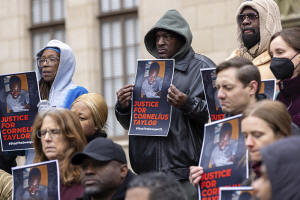Atlanta rethinks clearing homeless camps after a man is crushed inside
his tent
 Send a link to a friend
Send a link to a friend
 [February 01, 2025]
By JEFF MARTIN [February 01, 2025]
By JEFF MARTIN
ATLANTA (AP) — Atlanta leaders are reconsidering how they dismantle
homeless camps after a man was crushed inside a tent as a bulldozer
destroyed makeshift homes in preparation for Martin Luther King Jr.
holiday events.
Cornelius Taylor was living in the camp a few blocks from Ebenezer
Baptist Church, the King family's congregation, where dignitaries gather
for each year's commemorative service. A march was held from downtown to
the church that same weekend.
Now, Taylor's family is planning a Monday funeral at the same historic
church, and then a horse-drawn carriage will carry his coffin to City
Hall so that people there “can see who they killed,” said his sister,
Darlene Chaney.
The U.S. Supreme Court ruled last year that cities across the country
can enforce bans on homeless camping. But clearing the camps — as New
Orleans did ahead of Taylor Swift's concerts there — remains
controversial. Solutions are scarce amid soaring rents, natural
disasters and an influx of migrants that drove homelessness up 18%.
The family’s supporters hope his death can be a catalyst for change.
“Atlanta is the leader in so much," said civil rights lawyer Mawuli Mel
Davis, who is working with the family to investigate. “We're the leader
in movies, we're the leader in music. We're the leader in civil rights
and destinations.

“Why can't we lead the rest of the country in how to treat the unhoused
humanely?” Davis said.
Atlanta Mayor Andre Dickens met with family members and spoke of
Taylor's death during the King Day service at Ebenezer.
“Every life in this city matters to me,” Dickens said on social media.
Atlanta police officers were at the scene on Jan. 16, partly to provide
protection because some of homeless people had attacked workers in the
past, an officer wrote in a police report.
As “the large earth-moving machine” moved through, a man who had been
living at the camp waved down an officer, who found Taylor injured and
bleeding. Taylor was able to tell the officer “that something had fallen
on him” and to give his name after the officer pulled him out of the
collapsed tent, the report states.
Then, Taylor’s breathing decreased. He was foaming at his mouth. He was
taken to a hospital, where he was pronounced dead
[to top of second column]
|

Family members and activists protest the death of Cornelius Taylor,
an unhoused man killed when the city cleared an encampment last
week, in front of City Hall in Atlanta on Thursday, Jan. 23, 2025.
(Arvin Temkar/Atlanta Journal-Constitution via AP)

Taylor’s pelvis was split apart, and his spleen and liver were
crushed, said Harold Spence, another family lawyer. An autopsy
report has not yet been released by the Fulton County Medical
Examiner’s Office.
Taylor’s death, the mayor said, “demonstrates the need to reevaluate
and reassess our city’s policies concerning homeless encampments,
and how we can better serve our unhoused population.”
The temporary moratorium being considered by the city council should
lead to stronger policies and expanded outreach, Dickens said.
The tent camp was one of Atlanta’s largest, occupying a block where
buildings were razed long ago and spilling out onto Old Wheat
Street, alongside the interstate highways that separate downtown
from the Old Fourth Ward.
Although the area was being cleared in preparation for the King
holiday events, as Public Works spokeswoman Kim Rankins confirmed,
city officials said the plans were made months earlier and there was
significant “outreach” to people living there beforehand.
That process began in April 2024 and connected 21 people to shelter
or housing, said Cathryn Vassell, CEO of Partners for HOME, which
partners with the city on homeless issues.
“These spaces are incredibly unsafe not only for those who shelter
in them but also for the communities that surround them,” Dickens
said.
Chaney said her brother was an artist — he loved drawing — and even
when he was on the streets, he tried to take care of her.
When someone broke into her car one time, “he had a fit and was
ready to protect me because he was a protector,” she said.
“I don't know how I'm going to go on," his sister added. “I listen
to his voicemails, and I'm just grateful I have that."
All contents © copyright 2025 Associated Press. All rights reserved
 |